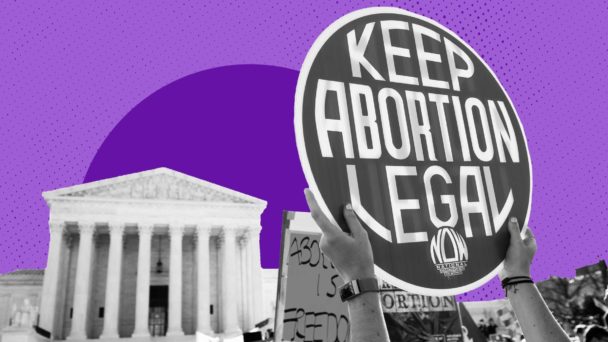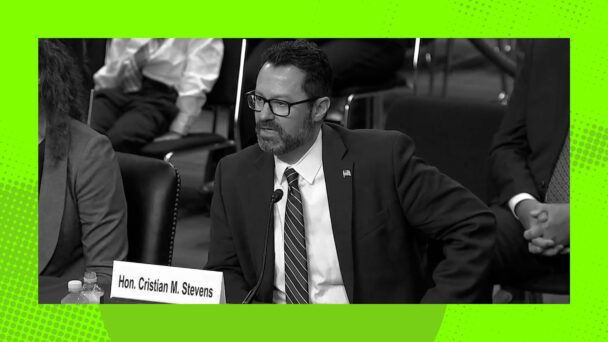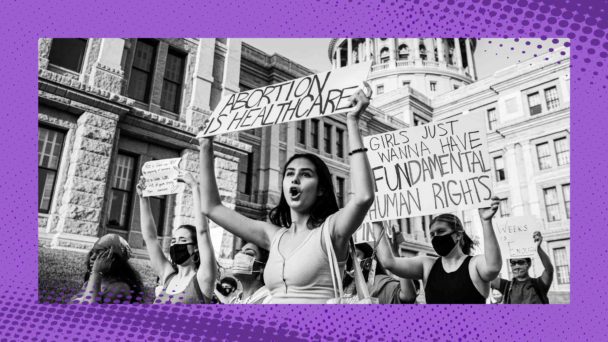As a journalist who covers reproductive rights, I’ve spent the first six months of Donald Trump’s second term waiting for the other shoe to drop on abortion. Sure, the president has pardoned nearly two dozen people who blockaded abortion clinics and signed a bill to kick Planned Parenthood out of Medicaid, but the administration has much more power to restrict abortion access than it’s wielded so far.
Trump’s picks for two relatively low-profile roles may signal where his administration is headed next: In recent months, he’s appointed a pair of anti-abortion zealots to work at the influential Office of Legal Counsel at the Department of Justice. OLC provides legal advice to the president and the entire executive branch, meaning its responsibilities include drafting legal opinions for the attorney general, reviewing executive orders and presidential proclamations, and assessing the constitutionality of pending legislation.
In December 2022, shortly after the Supreme Court’s Dobbs decision that overturned Roe v. Wade, the OLC under President Joe Biden notably published an opinion that abortion opponents hate. OLC opinions are considered binding across administrations, and this one said that sending abortion medications through the mail and common carriers like FedEx does not violate an 1873 law known as the Comstock Act, as long as the sender doesn’t know that the drugs will be used illegally. The Comstock Act is an anti-vice and sexual morality statute that bans the mailing of abortifacients, among other “indecent” items. But it never targeted legal abortion, and, for nearly a century, courts have interpreted it to include a medical exception.
Anti-abortion activists, however, view Comstock as something of a skeleton key that could ban abortion pills and even prohibit all abortions nationwide. Project 2025, a conservative playbook spearheaded by the Heritage Foundation, has called for the rescission of that Biden-era memo to once again permit Comstock prosecutions of what the right deems to be illegal abortions. Trump’s two recent OLC appointees are in a position where they’ll be able to do exactly that.
First, in April, Trump named Elliot Gaiser as assistant Attorney General for OLC, meaning Gaiser is in charge of the office. Gaiser, currently the anti-abortion solicitor general of Ohio, has clerked for multiple far-right federal judges, including Edith Jones of the Fifth Circuit Court of Appeals, Neomi Rao of the D.C. Circuit, and Justice Samuel Alito during the term when Alito wrote the Dobbs opinion. He also interned for the Heritage Foundation in 2013 and has been a member of the Leonard Leo-backed Teneo Network since 2017.
Gaiser’s positions on abortion are unequivocal. He called the procedure a “moral evil” in 2020, and has argued on behalf of Ohio that forced ultrasounds and waiting periods for abortion seekers do not violate the Reproductive Freedom Amendment to the state constitution, which voters passed in 2023. In response to written questions about abortion from New Jersey Senator Cory Booker, Gaiser said he believes that “nobody should be deprived of life, liberty, or property without due process of law.”
This careful and very specific language is important when we consider the record of Josh Craddock, another anti-abortion lawyer who said last week that Trump had appointed him deputy assistant Attorney General for OLC. (To give you a sense of how much power a person in this position wields, it’s the same role held by John Yoo, the author of the notorious 2002 torture memo.)
Clip via YouTube
If anything, Craddock is more of an extremist than Gaiser. He is a proponent of fetal personhood, a far-right legal theory asserting that life begins at fertilization, and that that blastocysts and embryos thus have Fourteenth Amendment rights. For this reason, Craddock opposes traditional in vitro fertilization, saying that, by following evidence-based protocols of testing embryos for quality and freezing or destroying the rest, the industry “denies legal protections to human embryos and currently allows tiny humans to be frozen or killed at will.”
Craddock made his case in a 2017 article in a Federalist Society-affiliated law review, where he argued that “preborn human beings are legal ‘persons’ within the original meaning of the Fourteenth Amendment.” He believes that the Fourteenth Amendment requires states to ban abortion and that, if states refuse, Congress should step in and pass legislation. In a 2025 article in the Catholic University Law Review, he argued that even if Congress does not act, courts could uphold fetal personhood, and the president can create it by executive order and direct federal agencies to comply with that view.
In his more recent piece, Craddock cites himself: In 2021, he co-wrote a proposal with Americans United for Life for a president to sign an executive order to establish fetal personhood and ban all abortion. The trio named its concept The Lincoln Proposal, after President Abraham Lincoln’s declaration that he would disregard Dred Scott v. Sandford, the 1857 case in which the Supreme Court held that Congress could not ban slavery in its territories. The authors say their concept “focuses presidential energy not merely on abortion’s regulation, but rather on the ultimate goal of the abolition of abortion.” As always, the comparison of abortion to slavery ignores that banning abortion results in forced reproduction.
And, alarmingly for an OLC appointee, Craddock is a vocal proponent of warping the Comstock Act to ban abortion. He told NPR in April 2024 that he believed the law “prohibits all interstate shipment or sale of abortion drugs and devices, regardless of whether state law allows abortion.” He was also involved in a failed 2022 attempt to get the city of Pueblo, Colorado, to pass an ordinance claiming that the Comstock Act supersedes state protections for abortion. (He was on a legal team that included Comstock evangelist Jonathan Mitchell.) In January, he signed a letter asking the Justice Department to rescind the Comstock memo and enforce the law as a ban on abortion pills. In the May 2025 law review article, he suggested that the president can even direct the Food and Drug Administration to revoke its 25-year-old approval of mifepristone, citing Comstock as a valid legal reason for the agency to do so.
Although Gaiser’s job requires Senate confirmation, Craddock’s does not, meaning only the most brain-poisoned followers of politics will ever hear about him. His appointment has received almost zero coverage beyond a two-sentence mention in Politico, and a local news story in Colorado, where he’s from.
Taken together, the selections of Craddock and Gaiser hint that the administration will soon launch fresh attacks on abortion. It certainly feels like there’s a ticking clock until the DOJ starts prosecuting people under a law passed before women could vote.





